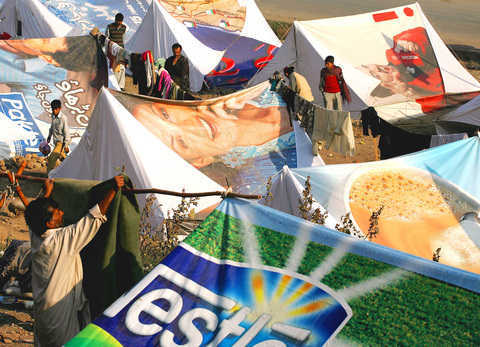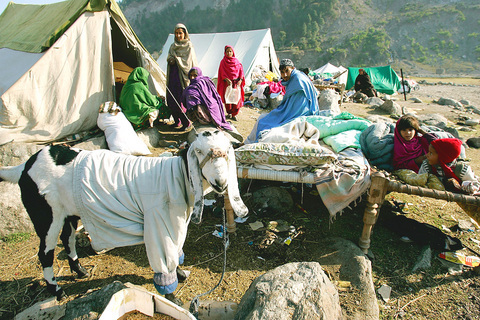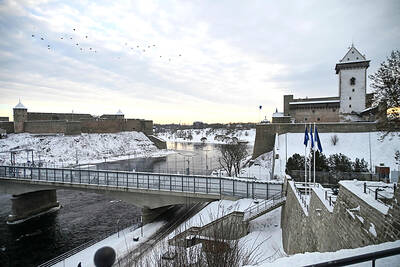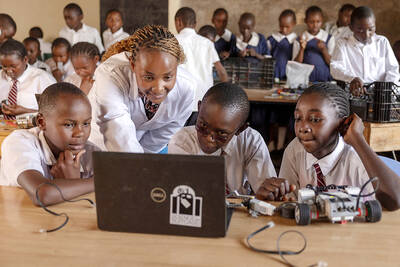Pakistan's army has set up two relief camps and a field hospital for quake victims along its disputed Kashmiri border with India, an army spokesman said yesterday, a day after the rivals agreed to open the heavily guarded frontier to ease the delivery of aid.
The field hospital and one of the camps are in the town of Chakothi, one of the five points where residents will be allowed to cross the border from next Monday, said Farooq Nasir, the army's spokesman in Muzaffarabad, the capital of Pakistan's part of Kashmir.
India has already set up three relief camps on its side of the border in Kashmir.

PHOTO: AP
"The opening of the five points will benefit the people of both sides," Nasir said, adding that Pakistan army engineers were speeding up efforts to clear boulders from roads leading to the five crossing points.
"If needed, heavy machinery would also be airlifted to those points to clear the roads," he said.
Relief groups and quake survivors have praised Sunday's unprecedented border deal, which allows relief goods to be sent in either direction and handed to local authorities at the crossings. Only Kashmiri civilians with families divided by the border will be allowed to cross on foot.

PHOTO: AP
Sounding an ominous note, Pakistan-based militants opposed to New Delhi's rule in Pakistan also have welcomed the move as giving them easier access to the Indian side.
Two top US officials were visiting to focus on aid efforts. The relief operation is rushing to secure shelter, food and medical attention for the more than 3.3 million people left homeless by the Oct. 8 quake before the brutal Himalayan winter sets in over coming weeks.
An estimated 80,000 people have died from the quake, with tens of thousands more injured.
Mark Ward, a USAID official responsible for Asia and the Near East, was visiting quake sites by helicopter, while General John Abizaid, head of the US military's Central Command, was to meet with Pakistani President Pervez Musharraf and other officials.
The US recently stepped up its relief efforts, sending in 11 more Chinook helicopters to join the 17 US choppers already flying missions into the quake zone.
USAID was flying additional tents to remote villages, although aid groups have said tin roofing is also badly needed to withstand the heavy snows expected to begin falling in November. About 800,000 people still lack any form of shelter.
Pakistan's Foreign Ministry said yesterday that the support of the international community will be as critical in the long term as in this emergency phase.
It confirmed a donors' conference on reconstruction will be held Nov. 19 in Islamabad.
"The resources required to help rebuild the lives of those who suffered from this terrible disaster cannot be provided by one country alone," it said in a statement.
UN Secretary-General Kofi Annan, who has urged nations to step up aid to Pakistan, will be among those attending, it said.
Also Monday, the first of four NATO CH-53 Sikorsky heavy lift helicopters from the German Air Force arrived to boost movement of supplies and personnel.
NATO doctors have begun preparations to set up a field hospital in the town of Bagh, while NATO engineers will clear roads, purify water, dig wells and help build temporary shelters, the alliance said a statement.
"We're working against the clock to bring aid to as many people as we can before the severe Himalayan winter is upon us," commander of the NATO disaster relief team, Vice Admiral John Stufflebeem, said in the statement. "That's what the real enemy is here -- time."
In the quake-devastated town of Balakot, some tent camp residents were burning donated clothing on cooking fires for warmth, while others were dressing sheep and other livestock in the donated items to ward against temperatures that plunged near freezing overnight.
In her first tour of the disaster zone on Sunday, UNICEF Executive Director Ann Veneman said casualties could mount from dysentery, exposure and untreated injuries if the survivors did not get more aid soon.
Though donors have pledged hundreds of millions to fund the international relief effort, only a fraction has been received. The UN has warned its emergency reserves are very low, and that helicopters could be grounded within a week without more funding.

Two medieval fortresses face each other across the Narva River separating Estonia from Russia on Europe’s eastern edge. Once a symbol of cooperation, the “Friendship Bridge” connecting the two snow-covered banks has been reinforced with rows of razor wire and “dragon’s teeth” anti-tank obstacles on the Estonian side. “The name is kind of ironic,” regional border chief Eerik Purgel said. Some fear the border town of more than 50,0000 people — a mixture of Estonians, Russians and people left stateless after the fall of the Soviet Union — could be Russian President Vladimir Putin’s next target. On the Estonian side of the bridge,

Jeremiah Kithinji had never touched a computer before he finished high school. A decade later, he is teaching robotics, and even took a team of rural Kenyans to the World Robotics Olympiad in Singapore. In a classroom in Laikipia County — a sparsely populated grasslands region of northern Kenya known for its rhinos and cheetahs — pupils are busy snapping together wheels, motors and sensors to assemble a robot. Guiding them is Kithinji, 27, who runs a string of robotics clubs in the area that have taken some of his pupils far beyond the rural landscapes outside. In November, he took a team

Civil society leaders and members of a left-wing coalition yesterday filed impeachment complaints against Philippine Vice President Sara Duterte, restarting a process sidelined by the Supreme Court last year. Both cases accuse Duterte of misusing public funds during her term as education secretary, while one revives allegations that she threatened to assassinate former ally Philippine President Ferdinand Marcos Jr. The filings come on the same day that a committee in the House of Representatives was to begin hearings into impeachment complaints against Marcos, accused of corruption tied to a spiraling scandal over bogus flood control projects. Under the constitution, an impeachment by the

Exiled Tibetans began a unique global election yesterday for a government representing a homeland many have never seen, as part of a democratic exercise voters say carries great weight. From red-robed Buddhist monks in the snowy Himalayas, to political exiles in megacities across South Asia, to refugees in Australia, Europe and North America, voting takes place in 27 countries — but not China. “Elections ... show that the struggle for Tibet’s freedom and independence continues from generation to generation,” said candidate Gyaltsen Chokye, 33, who is based in the Indian hill-town of Dharamsala, headquarters of the government-in-exile, the Central Tibetan Administration (CTA). It